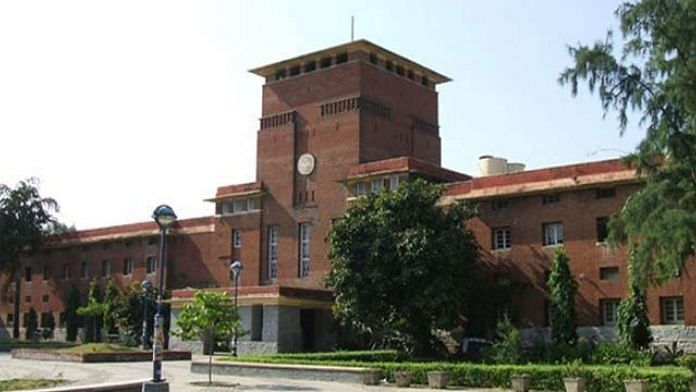The bill, to be tabled in the upcoming winter session, is also meant to allow universities to continue hiring teachers.
New Delhi: The National Democratic Alliance (NDA) government is all set to bring in a bill to override a court order and allow universities to hire faculty based on an institution-centric reservation formula.
The court order to hire faculty based on department-centric quotas had come under fire from teachers’ groups and political parties.
The opponents had argued that department-centric reservation would reduce the number of posts of teachers reserved for the scheduled class and scheduled tribe (SC/ST) communities.
The Modi government had earlier planned to pass an ordinance for this purpose but has since changed its mind, top sources told ThePrint.
The human resource development (HRD) ministry is now working on the bill, tentatively called the “Reservation in appointment of faculty by direct recruitment in teachers’ cadre, in Central Educational Institutions Bill, 2018.”
The bill is also meant to allow universities to continue hiring teachers — recruitment has been frozen after the Supreme Court said no faculty would be hired until it ruled on the HRD ministry’s July petition seeking to undo the new reservation system.
The bill is likely to be tabled in the upcoming winter session of Parliament after cabinet approval.
Also read: No ESMA in DU, Modi govt rolls back decision to curb dissent by university teachers
‘Fair selection’
According to a senior HRD ministry official, a detailed study was conducted to examine the impact of implementing department-wise reservation on the representation of SC/ST/OBC candidates in the universities.
“The University Grants Commission (UGC) had collected data and statistics that clearly shows that the implementation of the reservation policy by taking each department/subject as a unit, will impede the chances of fair selection of SC/ST candidates as well as OBCs and violate their fundamental rights under Articles 14, 16 and 21 of the Constitution,” said a senior HRD ministry official.
The ministry had filed a petition in the Supreme Court challenging an Allahabad High Court decision of April 2017 that was subsequently upheld by the apex court last October and also adopted by the regulator — the UGC.
That order mandates department-specific reservations on the grounds that there are entire departments without a single SC/ST professor.
However, because universities have many departments with just one professor, and the reservation will not apply to this, the impact of the court’s order is the exact opposite of what it wanted to achieve. If implemented, it would have meant a fall in the number of SC/ST faculty.
Officials also said that as per the data available, seats reserved for SC/STs and OBCs would reduce drastically in the cadre of assistant professors, and to even zero in some cadres.
Besides, changing an established roster will lead to a fall in vacancies for SC/ST candidates in the short to medium term.
“Though an SLP was filed, the matter has so far not been heard by the court. However, due to the matter being sub-judice, the process of recruitment has come to complete standstill leaving more than 5,000 faculty vacancies in various central universities that is adversely impacting the teaching process,” said another official.
Also read: PhD made mandatory for recruitment of university teachers, NET ceases to be sole criterion
‘Save reservation’
The push for the bill came from the HRD minister Prakash Javadekar, it is learnt.
“We are hopeful we will be able to save reservation for SC, ST and OBCs (Other Backward Classes),” Javadekar had told Rajya Sabha on 19 July.
According to the bill, the cadre or unit for determining reservation roster point will be “university/college” and not “department/subject”.
It will be applicable to Central universities, institution of national importance established by an Act of Parliament, and deemed universities, among others.
The institutions of excellence, research institutions, institutions of national and strategic importance and minority institutions will be exempted from the purview of the bill.
The 27 per cent OBC quota will be applicable across all direct-entry faculty positions in universities, and not just at the entry level as is being done currently. This would mean that colleges and universities will have to ensure OBC quota not just at the assistant professor level, but also at other direct recruitment levels — like that of associate professors, professors and senior professors.




I think this news was false
Any update on reservation in appointment of faculty by direct recruitment in teachers’ cadre, in central educational institutions bill, 2018.”
The proposed bill has been approved by the SC/ST commission but it is not in the list of bussines of the parliament for the curent session.